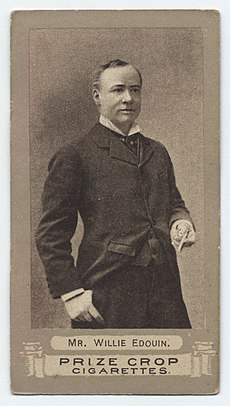Willie Edouin

Willie Edouin (1 January 1846[1] – 14 April 1908) was an English comedian, actor, dancer, singer, writer, director and theatre manager.
After performing as a child in England, Australia and elsewhere, Edouin moved to America, where he joined
Early years
Edouin was born in
Edouin moved to the United States in 1869, where he first appeared with
In 1877, Edouin returned with Thompson to New York. He soon appeared with Colville's Folly Company, an American farce-comedy troupe, and then with
Later years
Edouin returned to England in 1884, partnering with
Edouin appeared in a number of very successful
In 1906, Edouin toured in Britain and then returned to the United States in 1907, playing in vaudeville. By this time, however, he was losing his mental acuteness and decided to return to London. Although a very successful comedian, Edouin did not fare well as a manager and left a small estate.[2] During his career, Edouin portrayed as many as five hundred characters.[3]
Edouin died in 1908, aged 62,[1] and is buried in Kensal Green Cemetery in London.[7]
Family
Edouin married Alice Atherton; they had two daughters, Daisy and May, who each became actresses.[8]
References
- ^ a b Edouin's New York Times obituary says 1841
- ^ doi:10.1093/ref:odnb/32973. (Subscription or UK public library membershiprequired.)
- ^ a b c "Willie Edouin Dead", The New York Times, 15 April 1908, p. 9
- ^ a b Bordman, Gerald and Thomas S. Hischak. "Edouin, (William Frederick) Willie", The Oxford Companion to American Theatre, 2004, Oxford University Press
- ^ "Willie Edouin's Photograph Gallery", The New York Times, 9 February 1882, p. 1
- ^ "Our Omnibus-Box", The Theatre, 21 October 1888, p. 220
- ^ Listing of notable people buried at Kensal Green
- ^ Lee, Sidney, ed. (1912). . Dictionary of National Biography (2nd supplement). London: Smith, Elder & Co.
